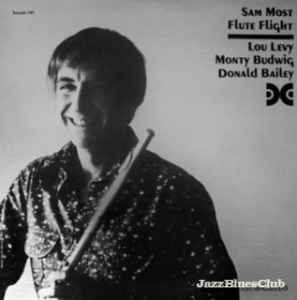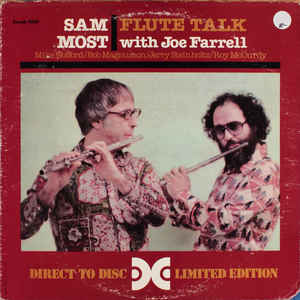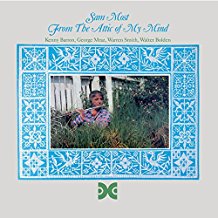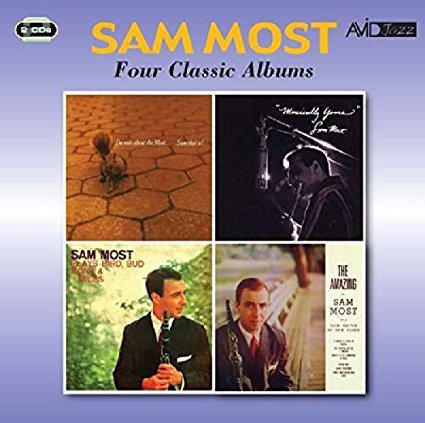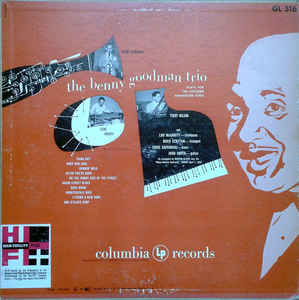-
Posts
13,205 -
Joined
-
Last visited
-
Donations
0.00 USD
Content Type
Profiles
Forums
Events
Blogs
Everything posted by Larry Kart
-
Raney is on this one: http://csgoshow.com/musics/619869-sam-most-the-amazing-mr-sam-most-1957-2014-bethlehem-album-collection-1000.html Haven't listened to it yet.
-
My impression isn't that they're sent into a minor frenzy at the hint of a honk from Flip but that they anticipate they'll momentarily have a chance/excuse to get full-scale frenzied in the prescribed JATP audience manner, but in this case the chance/excuse doesn't come.
-
All these are excellent (the rhythm sections on "Flute Flight" and "Mostly Flute" (Duke Jordan, Tal Farlow, Sam Jones, Billy Higgins -- just shoot me!) are out of sight, and the contrast between Most and Farrell on "Flute Talk" is interesting). All in all, some serious happy music-making. Mostly Flute - Sam Most | Songs, Reviews, Credits | AllMusic.webloc Mostly Flute - Sam Most | Songs, Reviews, Credits | AllMusic.webloc Mostly Flute - Sam Most | Songs, Reviews, Credits | AllMusic.webloc Mostly Flute - Sam Most | Songs, Reviews, Credits | AllMusic.webloc
-
I also like the small-group recordings that Most made in later years for Schlitten on Xanadu. Some excellent rhythm sections on those, and Most is a very agile and interesting improviser. There are times IIRC when it seemed like he might be playing the flute in the conventional manner and whistling through it at the same time -- quite effectively so, if I'm right about that, and, again if so, not in the Roland Kirk manner. Most had a bright mind and was a swinger.
-
Whether you hear what I hear there, it's some very good music.
-
Yes, that's it, but I can't find links anywhere to those two long jam tracks ("Perdido" and "Indiana" contrafacts) where Bird, so it seems to me, is so strikingly "far out."
-
Worth checking out is “Sam Most Plays Bird, Bud, Monk, and Miles” (Bethlehem, 1957)? Dave Schildkraut plays striking solos on tenor on five of the eight tracks -- four big band, four sextet, with charts by Bob Dorough, who also acquits himself quite well on piano. Contrary to what one might perhaps expect, the atmosphere is forthrightly boppish, not frou frou. Most is on clarinet throughout. Doug Mettome is the trumpet soloist, bold and interesting but also somewhat ragged at times — perhaps he was descending for good into junkiedom. As the other albums collected here make clear, Most was the most accomplished jazz flutist of that time, at least IMO.
-
Oops -- it is the same performance cut in half. But , as I said in the post up top, it's the other two jam tracks from that concert where Bird seems to me to be really out there harmonically.
-
No, that's from a different JATP at Carnegie Hall in 1949 performance. This is the one I mean: https://www.discogs.com/Various-Norman-Granz-JATP-Carnegie-Hall-1949/release/603191 As you can see, the version of "Lover Come Back To Me" in the clip and the one from the album are not the same, the one from the album being more than twice as long. Apparently there were at least two JATP at Carnegie Hall engagements in 1949.
-
A simple or maybe simple-minded question. Does anyone have Granz's JATP 1949 Carnegie Hall concert, with Bird, Sonny Criss, Navarro, Flip Phillips, et al. (Pablo). Listening last night to Parker’s solos on the three longish jam tracks — “Leap Here” (“Perdido “ changes), “Indiana” (with the “Ice Freezes Red” line), and "Lover Come Back To Me” — I find that I can’t quite grasp what (so to speak) harmonic plane it is that Bird adopts and essentially remains upon throughout, especially on “Leap Here” and “Indiana.” Sounds to me like he’s more or less abstractly (if you will) floating above the changes at quite an oblique remove, as though he were looking down at them from an unusual harmonic plane of his own invention — the position of this harmonic plane somewhat reminiscent, though earthier in flavor, of that of George Russell’s “Ezzthetic” and some of Russell's later RCA Jazz Workshop pieces. There are some later Parker performances where he does something similar, I think — e.g. IIRC a “Groovin’ High” from Uptown's “Bird — Boston 1952” album with Mingus and Dick Twardzik, where it sounds at times like he’s looking at the changes upside down or in a mirror. In any case, if you have that JATP album, give Bird’s solos on those tracks a listen and tell me that I have no idea what I’m talking about.
-
Sorry -- but it's been a while, and I can't find the options button. Any clue? I do nknow that if Use the "delete" button in the moderations area the whole thread is deleted, and we don't that again.
-
Probably bought it in the spring of 1954. Didn't really know what I was doing and never liked the album that much and/or I just didn't get that particular style at that time. Soon moved on to other things -- e.g. Norman Granz jam sessions, a Krupa-Roy Eldridge-Anita O'Day reunion with Roy's still scarifying recreation of his solo on "Let Me Off Uptown," Roy's own quartet album "Little Jazz" (a great one), a great Ellington 10-incher of the '40-'41 band, etc.
-
Put on tonight a 1957 Prestige blowing session that I hadn't listened to a long time -- "Roots," with Pepper Adams, Idrees Suileman, Frank Rehak, Bill Evans, Doug Watkins, and Louis Hayes -- and was pretty much stunned by the uniquely propulsive forward lean of Watkins' bass line on the very long (27 minute) title track. I say "uniquely" while granting that there's probably some kinship between Watkins and Oscar Pettiford in this respect, but Pettiford didn't get much chance to play in hard bop contexts (I think of Red Rodney's "Red Arrow," and Thad Jones' "Detroit-NY Junction) and that is where Watkins more or less lived musically, feeding off of what was there. What he lays down behind Adams' opening solo -- both in terms of time and note choice -- has to be heard to be believed.
-
You're right on that.
-
I reckon that it also comes, in Archia's case, from Coleman Hawkins and Ben Webster. There's a "Talk of the Town" from Archia on YouTube that's steeped in Hawkins, who of course famously recorded that tune.
-
Some nice ones but nothing that I recall as fantastic.
-
Yes, but it's the rougher, gruffer strain in Archia that I find intriguing. Later on he dueled to fine effect with Gene Ammons, of whom the same could be said. Gene Ammons, Tom Archia (tenor sax) Christine Chatman (piano) Leroy Jackson (bass) Wesley Landers (drums) Chicago, IL, October 12, 1948
-
with Wynonie Harris, fellow tenorman Hal Singer, band led by Hot Lips Page, in a Dec. 1947 session for King Records. https://www.youtube.com/watch?v=xVameLYxj7o https://www.youtube.com/watch?v=XAQRl-Hon-U
-

Return Of The Film Corner Thread
Larry Kart replied to JSngry's topic in Miscellaneous - Non-Political
"The Shape of Water" -- wow! Don't miss it. -
The Marsh influence is there in Turner, but I find it rather external -- a matter of Warne-like bits and pieces used in an almost decorative manner, not an attempt to grasp and extend/work personal variations on the way Warne thought, above all on his exceptional freedom of movement in so many respects. For someone who heard that in Warne and put it to work in his own way, go to Plugged Nickel Wayne Shorter, for one. And Ted Brown, too --less than Warne, yes, but a genuine inventor of much integrity. But I did find some early Turner enjoyable.
-

Album Covers showing musicians lying down
Larry Kart replied to Swinging Swede's topic in Miscellaneous Music
That's not what the settee said. -
I see; it was a compilation of two 10-inch Bethlehem LPs.
-
I'm confused. Could you post an image and or a link to the CD that has both of these albums on it?
-
When I did the "Creativity and Change" interview with Wayne Shorter for Down Beat in 1968 or '69, we paid him for it after the fact because the whole interview was a fascinating 90-minute or so monologue by Wayne -- don't recall asking him a single question.
-
Not to my knowledge, and certainly not out of my pocket. Can't imagine such a thing. If you work for a fairly major publication, like the Chicago Tribune, all interactions re: access between a subject, particularly an entertainer., and the publication are mutual. They want publicity, you want a story. Now if they know or suspect that you want to tear their face off, there might be some static, but how often does that situation occur, especially when it comes to performers, not politicians? (Michael Jackson post child-molestation charges would be one case, I suppose.) BTW, you're probably familiar with that old-time journalist line: "We got two kinds of publicity, which kind do you want?"
_forumlogo.png.a607ef20a6e0c299ab2aa6443aa1f32e.png)

